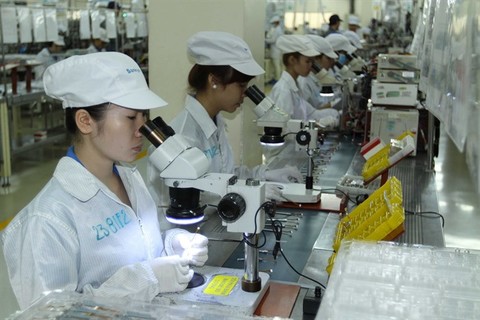Japanese firms discuss VN business obstacles
 |
| Workers process high-tech electronics accessories at Nidec Sankyo Vietnam Co Ltd’s plant in HCM City. - VNA/VNS Photo Thanh Vu |
The four issues include foreign workers’ compulsory social insurance participation, waste treatment regulations in the draft Law on Environmental Protection, regulations on the import of used machinery and equipment, and the import of automobiles regulated by the Government’s Decree 116/2017/ND-CP.
Chairman of the Japan Business Association in Viet Nam (JBAV) Hiroshi Karashima suggested the Vietnamese Government revise regulations on compulsory social insurance for foreign employees.
The purpose of the insurance scheme is to prevent employees from avoiding taking part in the social insurance, but this regulation forces many foreign workers to pay insurance premiums twice, in both their home country and in Viet Nam, Hiroshi said.
He called on the Government to allow exemptions for people that have paid compulsory insurance in Japan.
The mandatory insurance participation reduces the attractiveness of the country as an investment destination, the chairman highlighted.
In response to this recommendation, a representative of the Ministry of Labour, Invalids and Social Affairs (MOLISA) said that the payment of social insurance premiums is meant to protect the legitimate rights and interests of workers in Viet Nam.
Many countries have a similar issue and the common solution is to negotiate bilaterally, the representative said.
Importing used machinery
Many Japanese firms are concerned of the provision of Circular 23/2015/TT-BKHCN relating to the import of secondhand machinery.
Satoru Wachi, head of the group dealing with the issue, said that when Japanese enterprises relocate their production facilities overseas, they will also move their machines and equipment to the host country in order to shorten the time it takes to begin production.
According to Satoru, Vietnamese supporting industries are not as strong as Japan’s small and medium-sized enterprises (SMEs), so Japanese companies must assist with production in Viet Nam.
Restrictions on importing old machinery could hinder large investment flow into Viet Nam by Japanese SMEs.
The Japanese business association suggested that machinery and equipment imported for Japanese production activities should not be restricted in terms of the age of the equipment and should not be subject to the import regulations.
Deputy Minister of Science and Technology Pham Quy Duong said that Circular 23 was formulated with the main purpose of limiting the import of old machines to ensure quality and productivity and to avoid the energy waste caused by the use of old machinery.
The Ministry of Science and Technology has recognised firms’ difficulties with Circular 23 and made amendments, Duong said.
He said that the Law on Foreign Trade Management will come into force on January 1. Article 9 of the decree guiding this law’s implementation will have regulations related to the age of machinery and equipment imported into Viet Nam and the process for special cases.
The deputy minister insisted that imported equipment must meet the standards of safety, energy efficiency and environmental protection in accordance with standards of Viet Nam and some G7 countries.
Decree 116
Decree 116/2017/ND-CP on automobile production, assembly and import and maintenance services for automobiles causes problems for importers, said Toru Kinoshita, a member of JBAV. The decree requires some certificates provided by foreign authorised agencies.
However, in practice, the government of each country only tests and certifies according to that country’s regulations for domestic use. Vehicles manufactured for export are beyond their scope, he said.
Toru said that the decree also requires exhaust emission testing and technical quality assurance for each batch of completely built up (CBU) vehicles, but each test takes about two months and costs up to US$10,000. If car importers comply with this rule, they will waste a lot of time and money.
The association recommends that the Government apply only the model test for each vehicle type of the first shipment and accept the test report for subsequent shipments over a six-month period.
Minister and head of Government Office Mai Tien Dung, who is also Chairman of the Advisory Council for Administrative Procedure Reform, explained that the Decree 116 is intended to protect producers and consumers.
The minister said it is important to inspect each batch of goods to assess compliance with the law.
However, Dung asked the Ministry of Transport to cooperate with the Ministry of Justice and the Ministry of Industry and Trade to revise the regulations.
Minister Dung affirmed that the recommendations and questions from the Japanese enterprises will be considered by Viet Nam’s authorised agencies.
The Government official emphasised that the Vietnamese Government will continue to create a clear business environment for foreign investors.
What the stars mean:
★ Poor ★ ★ Promising ★★★ Good ★★★★ Very good ★★★★★ Exceptional
Latest News
More News
- The generics industry: unlocking new growth drivers (February 04, 2026 | 17:39)
- Vietnam ready to increase purchases of US goods (February 04, 2026 | 15:55)
- Steel industry faces challenges in 2026 (February 03, 2026 | 17:20)
- State corporations poised to drive 2026 growth (February 03, 2026 | 13:58)
- Why high-tech talent will define Vietnam’s growth (February 02, 2026 | 10:47)
- FMCG resilience amid varying storms (February 02, 2026 | 10:00)
- Customs reforms strengthen business confidence, support trade growth (February 01, 2026 | 08:20)
- Vietnam and US to launch sixth trade negotiation round (January 30, 2026 | 15:19)
- Digital publishing emerges as key growth driver in Vietnam (January 30, 2026 | 10:59)
- EVN signs key contract for Tri An hydropower expansion (January 30, 2026 | 10:57)
















 Mobile Version
Mobile Version